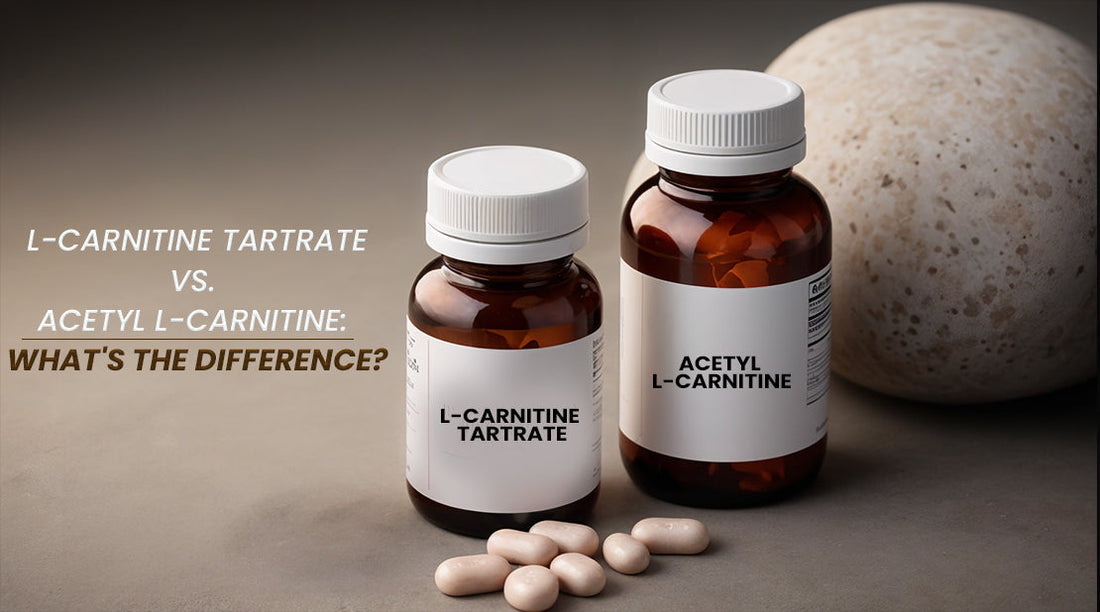

Comparing L-Carnitine Tartrate vs. Acetyl L-Carnitine: Which is Right for You?
Table of Contents
Are you looking to boost your endurance, improve heart health or lose weight? L-carnitine supplements might be the answer for you. But with so many types available on the market, how do you know which one is right for you?
In this blog post, we will compare two popular forms of L-carnitine: L-carnitine tartrate and acetyl L-carnitine. We will dive into their metabolism, nutrition, capsule forms, and dosages to help you make an informed decision. Furthermore, we’ll discuss the side effects of L-carnitine supplementation and its potential contribution to weight loss.
So let's get started!

What is L-carnitine tartrate vs acetyl L-carnitine?
L-carnitine tartrate and acetyl L-carnitine are different forms of the same amino acid with distinct functions. L-carnitine tartrate aids exercise performance by transporting fatty acids into cells for energy use, while acetyl L-carnitine promotes cognitive support by producing neurotransmitters. The choice between them depends on your specific health goals.
Metabolism and acetyl-L-carnitine
L-carnitine is an amino acid found in animal products and synthesized by your body from lysine and methionine. There are different types of carnitine supplements available, like acetyl-L-carnitine (ALCAR) and L-carnitine L-tartrate (LCLT). L-carnitine tartrate and ALCAR differ primarily in their benefits. While the former aids in transporting fatty acids to be burned for energy within mitochondria, the latter produces acetylcholine that can cross the blood-brain barrier. Although both forms have been shown to improve endurance, reduce muscle soreness, and support fat loss, their effects may vary depending on individual health goals. Additionally, it's crucial to follow the recommended dosage guidelines as high doses may cause gastrointestinal problems or harm kidneys.
L-Carnitine Tartrate vs. Acetyl L-Carnitine: What's The Difference?
L-carnitine is an amino acid that helps the body convert fatty acids into energy. It is naturally produced in the body, but it can also be found in foods such as meat, fish, and dairy products. L-carnitine supplements are available in a variety of forms, including L-carnitine tartrate and acetyl L-carnitine.
L-Carnitine Tartrate
L-carnitine tartrate is a salt of L-carnitine and tartaric acid. It is one of the most common forms of L-carnitine supplements. L-carnitine tartrate is thought to be beneficial for a variety of health conditions, including:
- Heart health
- Weight loss
- Muscle growth
- Cognitive function
- Mental health
Acetyl L-Carnitine
Acetyl L-carnitine is a form of L-carnitine that has been acetylated. This means that it has an acetyl group attached to it. Acetyl L-carnitine is thought to be more easily absorbed by the body than L-carnitine tartrate. Acetyl L-carnitine is thought to be beneficial for a variety of health conditions, including:
- Alzheimer's disease
- Parkinson's disease
- Depression
- Anxiety
- Fatigue

How does L-carnitine affect endurance?
L-carnitine has been shown to improve endurance in a number of ways. First, it helps to transport fatty acids into the mitochondria, where they can be burned for energy. This can help athletes to exercise for longer periods of time without fatigue. Second, L-carnitine helps to reduce lactic acid buildup. Lactic acid is a byproduct of exercise that can cause muscle fatigue.
A number of studies have shown that L-carnitine supplementation can improve endurance in athletes. For example, one study found that L-carnitine supplementation improved cycling performance in cyclists by 11%. Another study found that L-carnitine supplementation improved running performance in runners by 8%.
While L-carnitine supplementation can be helpful for improving endurance, it is important to note that it is not a miracle cure. L-carnitine will not make you an elite athlete overnight. However, it can be a helpful supplement for athletes who are looking to improve their endurance and performance.
Dosage recommendations for L-carnitine
For optimum results from l carnitine tartrate vs acetyl l carnitine supplement intake, it is crucial to adhere to the prescribed dosage instructions. To maintain optimal energy metabolism and fat loss, it is necessary to consume between 500-2000mg per day of any form of carnitine supplement. Taking L-carnitine before exercise can help reduce muscle soreness while enhancing endurance and energy levels.
It's worth noting that consultation with a physician before taking any dietary supplement, including l-carnitine l-tartrate or acetyl-l-carnitine, is advisable.
Does L-carnitine tartrate contribute to weight loss?
L-carnitine tartrate is a form of L-carnitine, an amino acid that helps the body convert fatty acids into energy. Some studies have shown that L-carnitine tartrate may help with weight loss, but more research is needed to confirm these findings.
One review of 37 studies found that L-carnitine supplementation significantly reduced body weight, body mass index (BMI), and fat mass. However, it had no effect on belly fat or body fat percentage. Another analysis of nine studies — mostly in individuals with obesity or older adults — found that people lost an average of 2.9 pounds (lbs), or 1.3 kilograms (kg), more weight while taking L-carnitine.
It is important to note that these studies were conducted with L-carnitine supplements, not L-carnitine tartrate specifically. It is also important to note that the effects of L-carnitine tartrate on weight loss may vary depending on the individual.
If you are considering taking L-carnitine tartrate for weight loss, it is important to talk to your doctor first. They can help you determine if L-carnitine tartrate is right for you and can help you develop a safe and effective weight loss plan.
Comparing L-Carnitine Tartrate vs. Acetyl L-Carnitine: Which is Right for You?
There are two main forms of L-carnitine supplements: L-carnitine tartrate and acetyl L-carnitine.
- L-carnitine tartrate is the most common form of L-carnitine supplement. It is a combination of L-carnitine and tartaric acid. Tartaric acid helps to improve the absorption of L-carnitine into the body. L-carnitine tartrate is typically used for athletic performance and fat loss.
- Acetyl L-carnitine is a more bioavailable form of L-carnitine. This means that it is more easily absorbed by the body. Acetyl L-carnitine is typically used for cognitive function and mood improvement.
So, which form of L-carnitine is right for you? It depends on your individual needs and goals. If you are looking to improve athletic performance or boost metabolism, L-carnitine tartrate may be a good option. If you are looking to improve cognitive function or mood, acetyl L-carnitine may be a better choice.
It is important to talk to your doctor before taking any L-carnitine supplement, especially if you have any underlying health conditions.
Here is a table that summarizes the key differences between L-carnitine tartrate and acetyl L-carnitine:
Feature |
L-carnitine tartrate |
Acetyl L-carnitine |
Form |
L-carnitine + tartaric acid |
Acetyl group attached to L-carnitine |
Absorption |
Less bioavailable |
More bioavailable |
Benefits |
Athletic performance, fat loss |
Cognitive function, mood improvement |
Dosage |
1-3 grams per day |
1-2 grams per day |
Side effects |
Mild side effects such as nausea, vomiting, and diarrhea are possible |
Mild side effects such as headache, dizziness, and insomnia are possible |
Ultimately, the best way to determine which form of L-carnitine is right for you is to talk to your doctor. They can help you to assess your individual needs and goals and recommend the best form of L-carnitine for you.
Should you take L-carnitine supplements?
It is best to seek advice from a healthcare professional before taking L-carnitine supplements. Such supplements may be beneficial for athletes and individuals with specific health conditions. However, the effectiveness of these supplements may differ depending on their form and dosage, so it's crucial to purchase them from a reliable source.
Let’s Sum Up
In conclusion, both L-carnitine tartrate and acetyl L-carnitine have different benefits, and the choice between the two depends on your goals and needs. L-carnitine tartrate is more beneficial for physical performance, while acetyl L-carnitine is more effective in cognitive health.

















